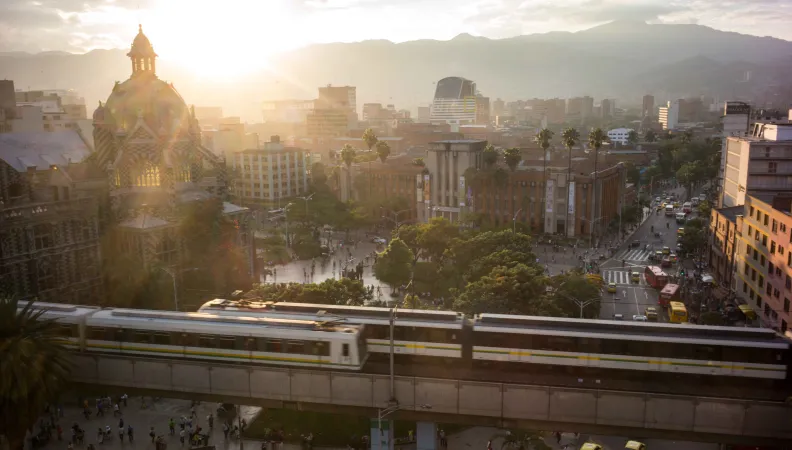 Legal notice EU (project) The Extension of the EU-AFD Research Facility on Inequalities in partnership with Fedesarrollo and in close collaboration with the Ministry of Finances implemented the methodology of the Commitment to Equity (CEQ) to analyze the country's fiscal structure and its impact on inequalities specially after major changes caused by the Covid 19 pandemic and the fiscal reform passed at the end of 2022.
Legal notice EU (project) The Extension of the EU-AFD Research Facility on Inequalities in partnership with Fedesarrollo and in close collaboration with the Ministry of Finances implemented the methodology of the Commitment to Equity (CEQ) to analyze the country's fiscal structure and its impact on inequalities specially after major changes caused by the Covid 19 pandemic and the fiscal reform passed at the end of 2022.
Context
Prior to the pandemic caused by COVID - 19, Colombia had shown positive results with respect to the reduction of poverty and inequality. For example, total poverty was reduced by 6.1 percentage points between 2012 and 2018 from 40.8% to 34.7% as was extreme poverty, which went from 11.7% to 8.2%, according to official statistics. Likewise, although Colombia is among the most unequal countries in the region, it reduced its Gini index by about 0.03 units from 0.539 in 2012 to 0.508 in 2017, according to data from the National Administrative Department of Statistics (Departamento Administrativo Nacional de Estadísticas, 2021).
However, with the public health contingency, many people lost their jobs or had their incomes reduced due to pandemic containment measures that affected both aggregate supply and aggregate demand. Naturally, according to official statistics, poverty levels increased significantly and inequality rebounded to the levels of five years ago. In fact, by 2020, the country was, according to the latest ECLAC Social Panorama, the most unequal in Latin America (Economic Commission for Latin America and the Caribbean, 2021).
In this sense, the country's tax structure plays a fundamental role to the extent that direct, indirect and in-kind transfers are transformed into support for the most vulnerable households so that they can meet their basic needs and balance these inequalities to some extent. In addition, taking into account that progressivity is one of the principles of the tax system, those with higher incomes should pay higher taxes to finance social spending. In this sense, the tax reform that began to take effect in 2018 and now the Fiscal Reform adopted at the end of 2022 made some major modifications to the corresponding statute with the objective of increasing revenues.
This project is part of the Extension of the EU-AFD Research Facility on Inequalities. Coordinated by AFD and financed by the European Commission, the Extension of the RFI will contribute to the development of public policies aimed at reducing inequalities in four countries: South Africa, Mexico, Colombia and Indonesia over the period 2021-2025.
Objectives
The methodology developed by the Commitment to Equity institute (CEQ) has been used to carry out this study. The CEQ methodology allows to do a fiscal incidence analysis, that is, to analyze the redistributive impact of public policy instruments, on the tax side, as well as on the social spending side, on poverty and inequalities. In this sense, based on household surveys, it is possible to assess the redistributive capacity of taxes and transfers (whether direct or indirect) to guide public policy in this area.
The aim of the study was to identify which policies, either from the tax side or from the expense side, allow a greater impact (negative or positive) on inequalities. This then gives us, and the government, a clearer picture of the effects of the fiscal structure.
In addition, the project sought to build a tool that parameterizes the tax structure and social spending and allows making microsimulations that are useful for policy discussions. In this sense, this project sought to accompany the teams of the Ministry of Economy, providing them with a tool that allows them to carry out the necessary simulations to evaluate the impacts of different policies. The recently adopted tax reform was also analyzed through the lens of this tool.
Research findings
You will find below the research paper related to this project:
 Legal notice EU (project) How do inequalities influence biological and social outcomes in MPAs in Indonesia? The Extension of the EU-AFD Research Facility on Inequalities program sought to answer this question in collaboration with SMERU to integrate inequality assessments and indicators into existing MPA policies in the country at all levels of governance.
Legal notice EU (project) How do inequalities influence biological and social outcomes in MPAs in Indonesia? The Extension of the EU-AFD Research Facility on Inequalities program sought to answer this question in collaboration with SMERU to integrate inequality assessments and indicators into existing MPA policies in the country at all levels of governance.
Context
MPAs are often associated with high poverty, being by design targeted at relatively untouched areas with low economic potential. Establishing an MPA can thus create a financial and social burden on resource-dependent communities, even if the benefits of doing so would bring higher yields or revenue in the future. Some stakeholders may benefit greatly from commercial activities (e.g., tourism, sale of higher-value products), while at the same time others are left out of the management processes, sometimes even those having most at stake.
Because MPAs will most likely affect user groups disproportionately, inequality issues among stakeholders can easily arise. Some aspects of MPA design, implementation, and management may contribute to positive ecological and well-being outcomes, while others will require tradeoffs. This coexistence of both co-benefits and trade-offs among stakeholder groups leads to tricky questions of equity, justice, and power in the design, implementation, and management of MPAs. There is a general lack of knowledge regarding how inequalities influence MPA outcomes.
In brief, MPAs are a driver of inequalities in communities that rely heavily on marine resources, and a powerful tool to help reduce them. While being an important aspect of the well-being of the people involved and of the success of MPAs, inequality assessments and metrics are currently largely absent in the design, implementation and management of MPAs. This research project aimed at a deeper understanding of the inequality dynamics in MPAs in Indonesia, drawing upon existing data and specific case studies. It helped us gain better knowledge of how inequalities influence biological and social outcomes in MPAs, and brought insights on how to integrate inequality assessments and indicators in existing MPA policies in the country, at every level of governance.
This project is part of the Extension of the EU-AFD Research Facility on Inequalities. Coordinated by AFD and financed by the European Commission, the Extension of the Facility contributes to the development of public policies aimed at reducing inequalities in four countries: South Africa, Mexico, Colombia and Indonesia over the period 2021-2025.
Objectives & results
This project first went through a scoping phase which enabled to better understand the role of MPAs and its link to inequalities. It then aimed to develop a framework for analyzing inequalities and their dynamics in MPAs in Indonesia, and a toolbox for mainstreaming inequalities in the design, implementation and management of MPAs. It has also fed into the policy dialogue conducted by the EU and AFD on marine resource management and environmental protection.
This project therefore resulted in:
- A working paper summarizing the current knowledge on marine protected areas and inequalities in Indonesia (carried out by LPEM).
- An in-depth research project on the links between inequality reductions and the management of marine protected areas, including cases studies of three MPAs (performed by the SMERU Institute).
- Training and capacity building activities with practitioners and MPA managers on the inclusion of inequalities in MPA management practices.
Research findings
You will find below the different publications related to this project :
- The benefits of Marine Protected Areas in fighting inequality and fostering environmental sustainability in Indonesia
- Balancing conservation and community welfare: Enhancing the management of Marine Protected Areas in Indonesia
- Can social inclusion benefit ecosystems?
Watch the replay of the "Research Conversations" webinar on this topic (July 2023):
Other research projects supported by the Extension in Indonesia
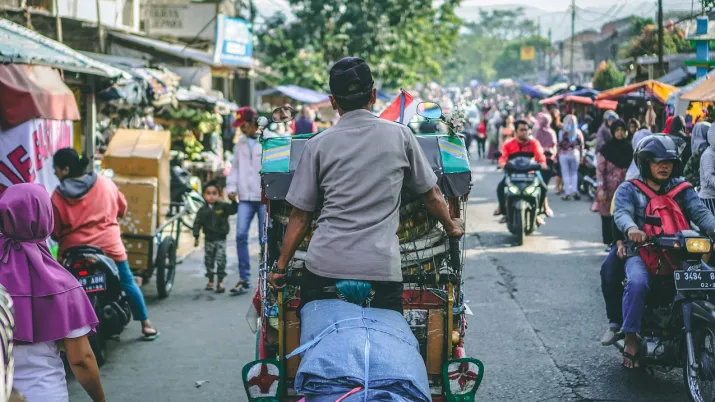
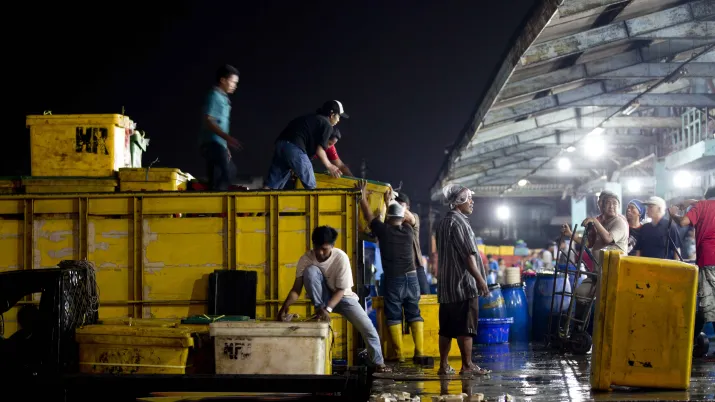
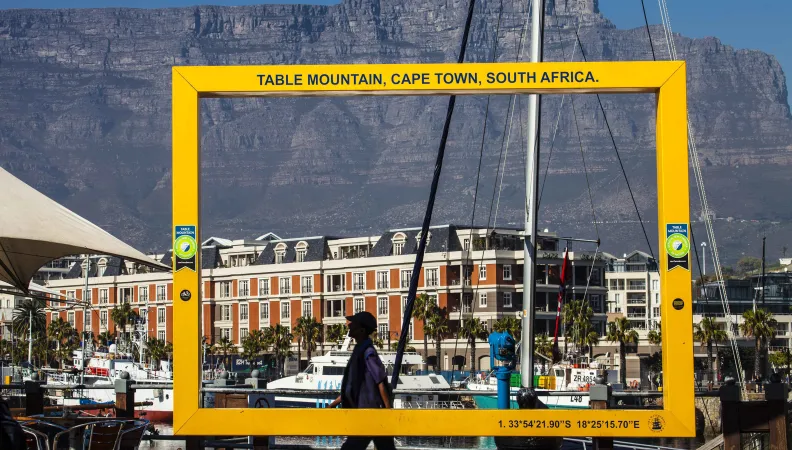 Legal notice EU (project) Does the use of stimulus programs and social grants by beneficiaries have an impact on the South African economy? Conducted by Infusion Knowledge as part of the Extension of the EU-AFD Research Facility on Inequalities, this research project examined the purchasing habits of stimulus beneficiaries and analyzed how the new "post-stimulus" environment impacts the trade and decision-making of commercial entities and some of their customers.
Legal notice EU (project) Does the use of stimulus programs and social grants by beneficiaries have an impact on the South African economy? Conducted by Infusion Knowledge as part of the Extension of the EU-AFD Research Facility on Inequalities, this research project examined the purchasing habits of stimulus beneficiaries and analyzed how the new "post-stimulus" environment impacts the trade and decision-making of commercial entities and some of their customers.
Context
In July 2019, Infusion Knowledge Hub conducted a study on opportunities for wholesale in Stock Road in Philippi in the Western Cape Province on behalf of a large South African supermarket chain. The purpose of the study was to understand the trading environment in the informal and small business market to elicit a value-added cash and carry shopping proposition (Vawda, Prinsloo and Prinsloo, 2019).
In June 2022, as part of a research program launched by the Presidency of South Africa and Agence Française de Développement, funded by the European Union, Infusion Knowledge Hub replicated the study to determine whether there are shifts in purchasing behaviour amongst the informal and small traders that participated in the 2019 research. In doing so, the study aimed to provide granular data on shifts in the informal and small traders’ operating environment around Stock Road in Philippi between July 2019 and June 2022. In addition, the research investigated the spending patterns of 30 Social Relief Distress (SRD) grant recipients and 31 Basic Education Employment Initiative (BEEI) participants.
This project is part of the Extension of the EU-AFD Research Facility on Inequalities. Coordinated by AFD and financed by the European Commission, the Extension of the Facility will contribute to the development of public policies aimed at reducing inequalities in four countries: South Africa, Mexico, Colombia and Indonesia over the period 2021-2025.
Objectives
This new research project aimed to contribute to the body of knowledge on the impact of social protection and employment stimulus measures on the formal and informal economies.
Two studies analysing the local effects of the South African Presidential Employment Stimulus Initiative (PES) and the national social grants programme were produced:
- One study, presented in note form, that builds on Infusion's long-standing relationship with Shoprite to allow SALDRU to use Shoprite's customer data to explore the shopping habits of stimulus beneficiaries. The focus was on unpacking purchasing data related to beneficiaries who receive the Distressed Social Relief Grant and those who are part of the school assistants programme managed by the Department of Basic Education (DBE).
- A research paper that details through descriptive and inferential statistical analysis the transfer to a mobile application, called NECTA, of a landmark study by Infusion and Shoprite conducted among informal vendors and "Spaza" stores in Philippi. This data provides an overview of what has been happening in these businesses since July 2019 (the date of the initial project), as well as an opportunity to see how the new "post-stimulus" environment is impacting the trade and decision-making of these business entities as well as some of their customers.
Research findings
You will find below the research paper related to this project:
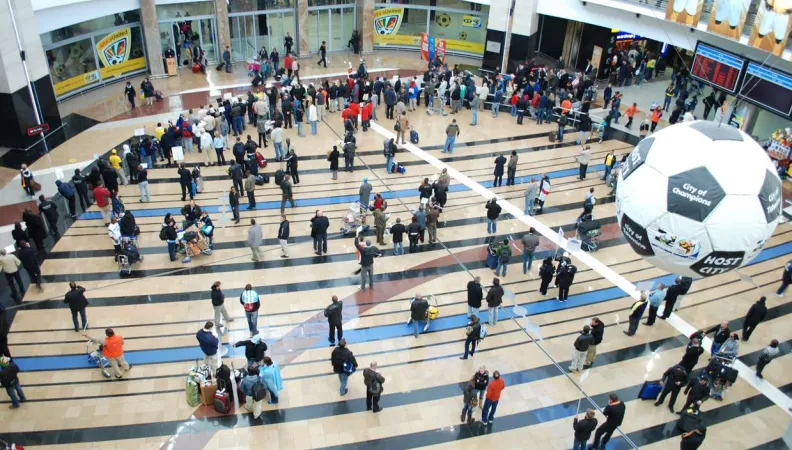 Legal notice EU (project) The fear that cash transfer programs (or social grants) can discourage labor market participation is common among policymakers locally and around the world, including in South Africa. To refute or confirm this fear, the Extension of the EU-AFD Research Facility on Inequalities worked with the Development Policy Research Unit (DPRU) of the University of Cape Town to analyze the impacts of the Covid-19 grant on labor market recovery and investment in productive activity in South Africa.
Legal notice EU (project) The fear that cash transfer programs (or social grants) can discourage labor market participation is common among policymakers locally and around the world, including in South Africa. To refute or confirm this fear, the Extension of the EU-AFD Research Facility on Inequalities worked with the Development Policy Research Unit (DPRU) of the University of Cape Town to analyze the impacts of the Covid-19 grant on labor market recovery and investment in productive activity in South Africa.
Context
In South Africa, the social grant system is relatively comprehensive in scope, directly benefiting one in three individuals, and mainly empowering the most vulnerable such as children, the elderly and people with disabilities from poor households. Despite the progressiveness of this system, there remains a lack of assistance to the unemployed, who are presumed to be able to support themselves through the labor market (Ferguson, 2015). However, such a view overlooks the widespread and structural nature of unemployment in South Africa, where over 70% of the unemployed have been unemployed for more than a year.
In this light, the expansion of the country's social grant system in response to the Covid-19 pandemic played an important role in filling this gap. On the margins of the system, a special Covid-19 grant of R350 was introduced to support this previously unreached and important group of unemployed adults. With one of the highest official unemployment rates in the world (32.6 percent in the first quarter of 2021), the grant was an important form of support for millions of vulnerable adults and was the first to use an explicit labor market eligibility criterion that could be considered a "labor market vulnerability transfer."
This project is part of the Extension of the EU-AFD Research Facility on Inequalities. Coordinated by AFD and financed by the European Commission, the Extension of the Facility will contribute to the development of public policies aimed at reducing inequalities in four countries: South Africa, Mexico, Colombia and Indonesia over the period 2021-2025.
Objectives
Conducted by the UCT-DPRU team, the objective of this research project was to quantitatively study whether the Covid-19 grant acted as a source of labor market recovery by leading to increased investment in productive labor market activities.
To do this, the research aimed to provide a detailed and quantitative descriptive analysis of transitions in labor market outcomes among Covid-19 grant recipients (measuring whether individuals moved from vulnerable to more productive activities, for example), as well as an analysis of the correlation between grant receipt and labor market outcomes. Finally, it estimated the causal effects of subsidy receipt on a range of productive labor market activities.
Method
The analysis exploited representative survey data collected during the pandemic in South Africa (from the National Income Dynamics Study: Coronavirus Rapid Mobile Survey, NIDS-CRAM) to answer the following cross-sectional and longitudinal questions about the role of the subsidy:
- What is the correlational relationship between receipt and job-seeking behavior, labor market participation, and the probability of finding a job ?
- What is the correlation between receipt of the subsidy and the transition from a relatively unproductive labor market state to a more productive state over time?
- Does this relationship vary across different groups and subgroups of recipients?
Research findings
You will find below the research paper related to this project:



